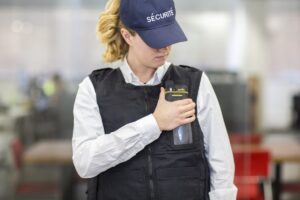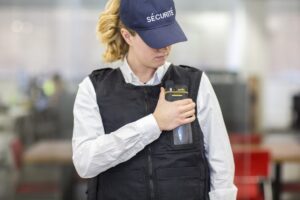
Job Details
Position: Security Guard Security Services
Number of Positions: 10
Shift: Sunday to Thursday 2300-0700
Status: Permanent
Location: Toronto, ON
Site: Data Centre-High Security
Pay Rate: $19.86/hr
DUTIES & RESPONSIBILITIES:
- Performs regular patrolling of hospital premises ensuring protection of Hospital building, property, and occupants;
- walking/standing during the duration of a 12 hour shift.
- Detects and corrects fire and safety hazards. Prepares written reports on all activities including pro-active reports on observed deficiencies.
- Investigates all complaints from patients, staff, visitors concerning thefts, personal injury, break-ins, fire and safety hazards, etc.
- Responds to assistance calls including fire alarms, bomb threats, violent persons, missing patients, building evacuations, help alarms, and the provision of security escorts as needed, etc.
- Interact with staff, patients, and visitors in a positive and customer service oriented manner. Enforces safety and security regulations according to Hospital and departmental policies.
QUALIFICATIONS:
- Graduate of a recognized 2 year community college program in Law Enforcement and Security, or Police/Military Academy preferred; or equivalent combination of education, training and experience will be considered.
- Previous experience in Healthcare Security an asset. Knowledge of computer software applications (Windows environment).
- Excellent communication (verbal/written), interpersonal, problem solving skills, and de-escalation techniques. Must be able to demonstrate Security’s core values of honesty and integrity while ensuring the Safety and Security of the Hospital’s patients, visitors, staff and assets.
- Demonstrated ability to assess and diffuse situations in an emergency situation. Must be punctual, and have an acceptable attendance record.
- Prospective candidates, upon selection, will submit to an RCMP criminal background check.
- Must have completed IAHSS (International Association of Healthcare Security and Safety) basic and advanced level of certification within 6 months of hire
- Must have a valid license with the Ontario private security and investigative services
- Must pass the hospital’s approved training program for use of force, handcuffing, and defensive batons within 6 months of hire
Hours: Must be available to work 12 hour rotating shifts, including days, nights and weekends
As a condition of employment, all external hires will be required to submit proof of COVID-19 vaccination or documentation unless a valid accommodation under the Ontario Human Rights Code exists. Please note, if you are extended an offer of employment, you will be required to provide proof of vaccination in Ontario QR Code format. All internal candidates must be in compliance with Unity Health Toronto¿s COVID-19 Vaccination Policy.
What skills and qualities are important for a Security Guard?
To excel as a Security Guard, certain skills and qualities are crucial for ensuring the safety and security of individuals, properties, and assets. Here are some important skills and qualities for a Security Guard:
- Alertness and Observational Skills: Security Guards need to maintain a high level of alertness and have strong observational skills to detect potential threats, suspicious activities, or security breaches. They should be able to pay attention to detail and quickly assess situations to take appropriate action.
- Strong Communication Skills: Effective communication is essential for Security Guards to convey information clearly and professionally. They should be able to communicate with individuals from diverse backgrounds, collaborate with team members, and provide accurate reports and incident documentation.
- Physical Fitness and Stamina: Security Guards may need to perform physical tasks such as patrolling, conducting inspections, and responding to emergencies. Physical fitness and stamina are important for carrying out these duties effectively and maintaining a proactive presence.
- Knowledge of Security Procedures and Protocols: Security Guards should possess a solid understanding of security procedures and protocols relevant to their assigned duties. This includes knowledge of access control systems, emergency response procedures, fire safety protocols, and relevant laws and regulations.
- Crisis Management and Problem-Solving Skills: Security Guards may encounter various situations that require quick thinking and decisive action. They should be capable of assessing risks, managing crises, and making sound decisions under pressure. Problem-solving skills are also crucial for resolving security-related issues effectively and efficiently.
- Integrity and Professionalism: Security Guards are entrusted with maintaining the security and integrity of their assigned areas. They should demonstrate a high level of professionalism, ethical conduct, and personal integrity. Confidentiality and the ability to handle sensitive information with discretion are also important.
- Customer Service Orientation: Security Guards often interact with the public, employees, and visitors in a professional and courteous manner. Having good customer service skills allows them to handle inquiries, provide assistance, and address concerns while maintaining a calm and respectful demeanor.
- Knowledge of Technology and Security Systems: Many security roles involve using various technological tools and security systems. Security Guards should be comfortable operating surveillance cameras, access control systems, alarms, and other security-related equipment. They should also be able to troubleshoot basic issues and report malfunctions promptly.
- Teamwork and Collaboration: Security Guards may work as part of a team or alongside other security personnel, law enforcement agencies, or emergency responders. Being able to collaborate effectively, share information, and coordinate efforts is crucial for maintaining a safe and secure environment.
- Adaptability and Stress Management: Security Guards may face unpredictable situations and varying work conditions. Being adaptable and able to manage stress is important for maintaining composure and making appropriate decisions in challenging or rapidly changing environments.
- Legal and Ethical Knowledge: Security Guards should be aware of relevant laws, regulations, and ethical guidelines pertaining to their roles. This includes understanding the limits of their authority, privacy rights, use of force regulations, and any specific industry regulations that apply to their work.
Developing and continuously improving these skills and qualities through training programs, on-the-job experience, and professional development opportunities can help Security Guards enhance their effectiveness and contribute to creating safe environments.
What education and certification are required to become a Security Guard?
The education and certification requirements to become a Security Guard can vary depending on the country, state or province, and the specific employer or jurisdiction. Here’s a general overview of the typical requirements:
- Education: In many cases, a high school diploma or its equivalent is the minimum educational requirement to become a Security Guard. However, specific educational requirements may vary depending on the employer and jurisdiction.
- Security Guard Training: Many jurisdictions require Security Guards to complete specific training programs before they can work in the field. These training programs cover essential topics such as legal responsibilities, emergency procedures, communication skills, report writing, and basic security principles. Training programs can be offered by private security training schools, community colleges, or specialized institutes.
- Background Checks: Security Guard positions often require candidates to undergo a thorough background check, including criminal record checks and reference checks. This is to ensure that individuals with certain criminal histories or questionable backgrounds are not employed in security roles where they may have access to sensitive information or be responsible for public safety.
- Licensing and Certification: Depending on the jurisdiction, Security Guards may need to obtain a license or certification to legally work in the field. The requirements for licensing or certification vary widely and can include completing specific training programs, passing exams, meeting minimum age requirements, and providing proof of identification.
- First Aid and CPR Certification: Many employers require Security Guards to hold a valid certification in first aid and cardiopulmonary resuscitation (CPR). This certification ensures that Security Guards are equipped to provide immediate medical assistance in case of emergencies until professional medical help arrives.
- Additional Specialized Training: Depending on the specific security role or employer, additional specialized training may be required. This can include training in areas such as crowd control, access control systems, use of force, non-violent crisis intervention, firearms handling (where permitted and required), or specific industry-related practices.
It’s important to note that the specific education and certification requirements for Security Guards can vary significantly depending on the jurisdiction and employer. Different regions may have their own regulatory bodies or licensing authorities that set the standards for security professionals. Therefore, it is advisable to check with local regulatory bodies or the employers where you wish to work as a Security Guard to obtain accurate and up-to-date information regarding the education and certification requirements in your specific area.
Who can apply to this job?
The employer accepts applications from:
- Canadian citizens and permanent or temporary residents of Canada.
- Other candidates with or without a valid Canadian work permit.
How to apply
Online: Apply On Company WebSite
What is the work environment like for Security Guard?
The work environment for Security Guards can vary depending on the specific role and employer. Here are some common work environments where Security Guards may be employed:
- Commercial Buildings and Offices: Many Security Guards work in commercial buildings, office complexes, or corporate settings. They may be responsible for access control, monitoring security systems, conducting patrols, and responding to incidents or emergencies within the premises. The work environment can include lobbies, reception areas, control rooms, and various areas within the building.
- Retail Stores and Shopping Centers: Security Guards are often employed in retail environments to deter theft, monitor surveillance systems, and ensure the safety of customers and staff. They may conduct bag checks, patrol store areas, respond to alarms, and assist with crowd control during busy periods or special events.
- Residential Complexes: Security Guards may be employed in residential complexes such as apartment buildings, gated communities, or condominiums. Their responsibilities can include monitoring entry and exit points, enforcing access policies, patrolling the premises, responding to security incidents, and ensuring the safety and security of residents.
- Educational Institutions: Security Guards can work in schools, colleges, or universities to maintain a safe environment for students, staff, and visitors. They may monitor entrances, patrol the campus, respond to security concerns or emergencies, and enforce campus security policies.
- Healthcare Facilities: Security Guards may be employed in hospitals, clinics, or other healthcare facilities to ensure the safety of patients, staff, and visitors. They may control access to restricted areas, respond to security incidents or emergencies, and assist in maintaining a secure and calm environment within the healthcare facility.
- Industrial Sites and Construction Sites: Security Guards may work in industrial sites, factories, or construction sites to protect assets, monitor access, prevent unauthorized entry, and enforce safety regulations. They may conduct regular patrols, monitor security systems, and respond to potential security breaches or safety concerns.
- Event Venues and Entertainment Facilities: Security Guards are often employed in event venues, stadiums, concert halls, or entertainment facilities to maintain crowd control, enforce entry protocols, monitor for suspicious activities, and respond to security incidents. They may work during concerts, sporting events, conferences, or other large gatherings.
- Transportation Hubs: Security Guards can be stationed at transportation hubs such as airports, train stations, or bus terminals. They may monitor security checkpoints, patrol public areas, assist with crowd control, and respond to security incidents or emergencies within the transportation facility.
The work environment for Security Guards can involve both indoor and outdoor settings, depending on the specific role and responsibilities. They may be required to work in various weather conditions and may need to stand or patrol for extended periods. Shift work, including evenings, nights, weekends, and holidays, is common in the security industry to provide 24/7 coverage.
It’s important to note that the work environment for Security Guards can present different challenges and risks depending on the specific setting and potential security threats. Security Guards should be prepared to adapt to varying situations, maintain a professional and vigilant presence, and follow the specific protocols and procedures established by their employers.



